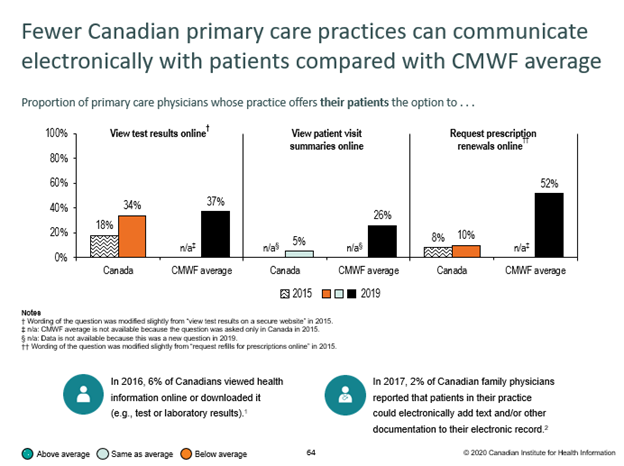The initial national IT efforts in Canada started in the late 1990s. Canada Health Infoway (CHI), an independent not-for-profit organization funded by the federal government, was established in 2001 to lead the national IT efforts, including developing an interoperable electronic health record for all Canadians. Since its inception, CHI has received $2.45 billion in federal funding.
Based on the Commonwealth Fund survey, in 2019, more family doctors in Canada are using electronic medical records (EMRs), but these systems are not connected. As a result, few can share patient clinical summaries(25%), laboratory and diagnostic test results(36%), or a list of medications taken by a patient(33%) with other general practitioners, specialists, hospitals, and nursing homes. In these cases, ratios are generally 50% lower than the average ratio of Commonwealth countries surveyed.
In many instances, hospitals within the same province or territory that transfer or refer patients to one another may have EMRs systems that cannot communicate, and digital connectivity on long-term and senior care coordination and communication is minimal. I strongly believe in patient-centered care and its impact on the overall outcome of patients and our healthcare system.
But, unfortunately, after more than 20 years of investment, only 5% of patients can view visit summaries, and only 10% can request a prescription refill online.

Empowering patients to actively manage their health and collaborate with healthcare providers and researchers is the key to better understanding the person’s health over time and reducing office visits and hospital readmissions, resulting in better patient outcomes and experience.
I think it is time for us to look at our challenges and think differently. It is time for all levels of government to work together as one team and put aside regional power struggles.
We need a pan-Canadian approach to healthcare management, delivery, and communication. We are lucky that we have a wealth of data to analyze, and we can learn from other jurisdictions that have been more successful.
eHealth is very complex, and it is not just a financial problem that can be solved by spending more money; we need a change in perspective and a collaborative effort to make it happen. We must aim beyond just fixing the user interface or improving interoperability.
We shall focus on a person’s health and wellness plan rather than reactive transaction-based clinical documentation. We should leverage artificial intelligence (AI) to analyze the data and focus on delivering the relevant information at the right time to the right individual to make health care more effective, efficient, and equitable. We need to improve data quality, interoperability, and access to focus on real challenges that AI can alleviate.
We are behind our objectives set in 1990, Canadians deserve better, and we can do this together.
The Covid-19 experience showed us we could work together to achieve what was considered impossible in the past.
We owe this to ourselves and our future generations.
References:

